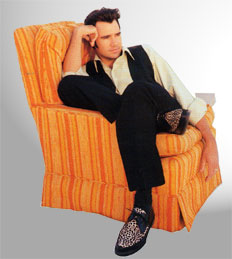

“All
I wanted was to be there on stage in the lights.
It was all I thought about. I
would sit in class and underneath my homework I’d be lifting up the paper and
writing a song. I never wanted to
be like anybody else. My mother has
notes in boxes that I wrote in kindergarten that say, ‘I want to go to
Nashville to be a star.’ I always
knew that I wanted to come up here.”
A
hotshot on guitar by his mid teens, Eric Heatherly joined a series of bands that
played VFWs. Pool parties, drugstore openings, car lots and anyplace else that
would have them. After a year of
college on a full music scholarship, he told his parents he wanted to make music
his life. In 1990-91 he rose to
prominence as the star attraction at a Chattanooga collegiate club called
Yesterdays.
He
moved to Nashville, ten spent three years on the road, bringing his high-octane
style to a boil in front of some of
the rowdiest, drunkest crowds on the North American continent.
That period of his life ended with a near-fatal car crash in Illinois
that destroyed almost every bit of the equipment he owned.
“The
car was totaled. Flipped upside
down. But there was the green Strat
lying out on the highway. So I ran
over, picked it up and strummed one chord and it was still in tune.
I said, I’ll use this guitar forever.
He
limped back into Nashville in 1994, this time with a staff songwriter’s job at
Orbison’s Still Working Music publishing company.
He parked cars at the Hermitage Hotel, shoveled gravel on roadways and
worked for a landscaper. All the
while the fire kept burning inside of him.
“I
had gone to I don’t know how many labels and producers, just banging their
doors down. They all wanted me to
put on a cowboy hat, a buckle and some boots.
I told every single one of them the same thing:
“I’m a guitar slinger.’ I
was doing Carl Perkins ad dreamy Roy Orbison-y ballads.
They didn’t want anything without a hat and a big acoustic guitar. I didn’t practice for 20 years to stand on stage and strum
three chords. I wanted to solo on
guitar like Ricky Scaggs and Steve Wariner and Vince Gill.
I wanted to be the next guy like that.”
Thoroughly
discouraged, Eric decided to head for the wrong side of Nashville’s tracks to
blow off some musical steam. In
late 1996 he settled in as a weekly noise maker at one of Music City’s most
legendary beer joints, Tootsi’e Orchid Lounge.
“I
said, ‘I don’t care if we get paid or not.
I just want to play every single week with a band doing all my original
tunes and just make as much noise as I can.’
I was dressing the guys in thrift store ties and vests.
The room was gritty and grimy, just a no-hype juke joint.
The owner said, ‘I really don’t think you’ll last more than two or
three weeks. But if you want to
waste your time and do it, come on in.’.”
Within
weeks a “scene” developed around the charismatic Eric and his sizzling
country-rockabilly combo. By the
time word reached Music Row about this young dynamo who lit up lower Broadway
like a firecracker, women were dancing on top of the bar and hundreds were
singing along.
“These
label people walked in and saw 250 people singing the words to every song and
they couldn’t believe it. I would watch the exact same people who weren’t interested
a couple of years before all of a sudden begin to light up.
As they would walk out they’d give me that grin and wink and drop their
business cards right in the tip jar.”
Shania
Twain hired him to back her on the 1997 Country Music Association Awards Show
and he subsequently offered a slot in her touring band.
But Eric Heatherly stuck to his guns.
After the TV awards he returned to Tootsie’s and waited for fate to
smile on him. It did, Twice.
He met
his wife Heather, a Tootsie’s bartender.
When they wed last year she became, that’s right Heather Heatherly.
The Mercury Records at last turned him loose in the studio with producer
Keith Segall (Mercury Nashiville’s Sr. VP of A & R ) to make music his
way. No hat, No boots, Just talent.
“I
asked Keith, ‘Do I need to tone my style down a little?
He said, ‘No man, just hit it.’”
Hit
it, he does. Eric Heatherly’s
album is the work of a fire-breathing rockabilly evangelist.
It brings back all the “edge,” excitement and honesty that
contemporary country music has nearly lost.
Millions can now hear the sound that Lower Broadway’s honky tonkers
found so delightfully infectious.
“There
was a truck driver who came though St. Louis and somehow always made sure he got
here for our show. I talked to that guy and said, ‘I can’t believe you do
this every week.’ He said,
‘It’s what keeps me going.’.”
Amen,
brother.